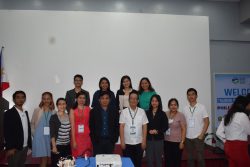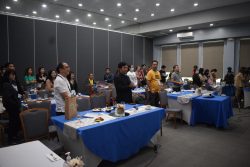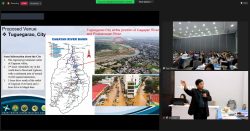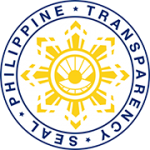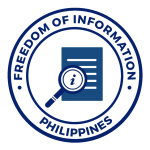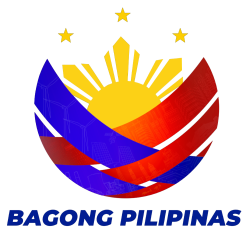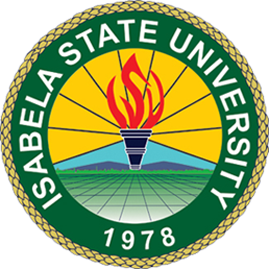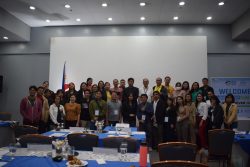
As the Isabela State University upholds the mantra of the world water day on accelerating change, the Integrated Flood and Water Resources Management in ASEAN Basins for Sustainable Development Project of the University, led by the Vice President for Research and Development, Extension and Training, Dr. Orlando F. Balderama, spearheaded a Training Workshop and Techno Forum in the Philippine River Basins.
This capacity development was held on March 16-17, 2023, at the Microtel Hotel, UP Technohub, Quezon City. As a University for innovation, this training workshop aimed to cascade programs on technology and institutional interventions for river basin management through basic trainings on modelling software used in numerous research projects such as Soil and Water Assessment Tool, Rainfall-Runoff Inundation Ensemble Model, and Google Earth Engine.
Numerous focal persons from every regional and satellite office of the Department of Environment and Natural Resources (DENR) all over the country participated via face-to-face scheme and Zoom platform for a large-scale capacity building activity. Other participants were from the Mindanao Development Authority (MDA), Philippine Atmospheric, Geophysical and Astronomical Services Administration (PAGASA), and Isabela State University.
The technology transfer activity was graced by For. Nelson V. Gorospe, the Executive Director of DENR-RBCO. “This techno forum will be a huge step in spreading information and knowledge about water management in our river basins that help mitigate disasters caused by floods and droughts associated with climate change effects,” he accentuated. Dr. Ricmar P. Aquino, ISU President, had also displayed his all-out support to this nationwide technical session through his welcome message which gave prominence to institutional reforms on water as a solution to the fragmented water resources management.
Moreover, Dr. Lanie A. Alejo, Director of Water Research and Development Center, elucidated the rationale and focus of the two-day training workshop by giving emphasis on the adoption and mainstreaming of cutting-edge technologies and systems. Mr. Akinobu Nishida, the Deputy Director of International Affairs Division Management and Planning Development of Japan Water Agency, presented the introduction to NARBO and overview of IWRM principles and practices in Japan. Specifically, he underscored the salience of the selection of the best measures that address the key issues in a river basin.
Likewise, Dr. Balderama also underlined numerous integrated water resources management good practices in the Cagayan River Basin to provide additional research-based information on watershed management and orient the participants on ISU’s internationalization and collaborative ventures with experts from Japan. In addition, Prof. Tetsuya Sumi from Disaster Prevention Research Institute of Kyoto University (DPRI-KU) explicated the collaborative efforts of Japan and Philippines in river basin management. He pointed out the significance of the policy initiatives on comprehensive upgrading of existing dams for sustainable development.
In the afternoon, the series of basic trainings on trailblazing technologies for climate change adaptation and flood management highlighted the techno transfer activity. Essentially, Engr. Czarimah L. Singson, ISU-DOST Science Research Specialist (SRS), facilitated the Basic Training on Soil and Water Assessment Tool for Assessing Climate Change Impacts on Streamflow with Demonstration. On the other hand, Engr. Englebert O. Manmano, SRS, led the participants in acquiring the basic skills on the use of TELEMAC model to estimate sediment transport through a demonstration method. Both resource speakers provided a concise background of the modeling tools and supplemented it with a simulated data input for the illustration of the calibration process.
On the second day of the training, Prof. Sameh Ahmed Kantoush from the DPRI-KU instigated the technical session by conveying a lecture on flood mitigation and risk communication under successive typhoons at Cagayan River Basin in the Philippines. He also highlighted the need for urgent interventions like optimization of sediment management and construction of additional dams, integrated approach to risk communication with key dimensions such as rainfall-runoff forecasting, addressing socio-economic impacts of natural disaster, flood risk communication, and flood mitigation measures.
Afterwards, Engr. Christine B. Mata, SRS, conducted the Basic Training on Google Earth Engine for Rapid Flood Damage Assessments with Demonstration. Engr. Christine Gay Liberato, on the other hand, spearheaded the skills acquisition process on Rainfall-Runoff Inundation Model with Rainfall Ensemble Forecast for Flood Forecasting with Demonstration. The participants displayed their profound interest with the aforementioned topics by contextualizing the significance of the modeling techniques to their respective work functions.
Furthermore, Dr. Balderama facilitated the deliberation of some way forward plans to continuously sustain the forged partnership between the University and its national stakeholders. The plans focused on water security road mapping in river basin, network extension of IRBM management, creation of University consortium for IWRM and IRBM, series of capacity building activities, FSMART 2024, and new R&D initiatives. In a similar vein, For. Gorospe supplemented the upcoming activities by highlighting information about river basin organizations, participation to international conferences, implementation of nature-based solutions, adoption of NWRB’s best practices, creation of water resources management office, and dam construction among others.
Lastly, Dr. Jeoffrey Lloyd R. Bareng, the University Director for Research and Development, synthesized all the specific activities that transpired during the two-day training workshop and techno forum. As he concluded the program, Dr. Bareng stressed, “With all the concerted efforts poured into this undertaking…we continuously hone our capabilities towards a brighter future and a more disaster-resilient community for everyone.” By and large, the participants appreciatively expressed their anticipation of more in-depth trainings organized by ISU as a good training provider, and in collaboration with numerous national and cross-border stakeholders.
